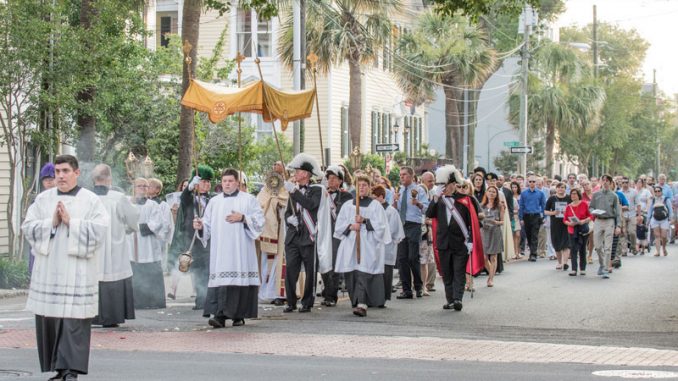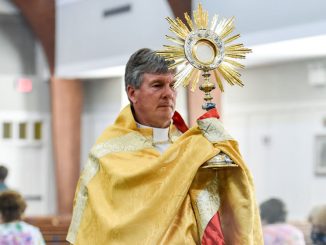
The Solemnity of the Most Holy Body and Blood of Christ is also known as the Solemnity of Corpus Christi, which translates from Latin to “Body of Christ.”
This feast celebrates the Real Presence of Jesus Christ in the Holy Eucharist — Body, Blood, Soul, and Divinity. It is traditionally celebrated on the Thursday following the Solemnity of the Holy Trinity or, in countries where it is not a holy day of obligation, on the following Sunday.
At the Vatican, Pope Francis will recite the Angelus prayer at noon Sunday, June 23, with visitors gathered in St. Peter’s Square. In the evening, at a parish in Rome’s Casal Bertone neighborhood, he will celebrate Mass for the feast of the Body and Blood of Christ and lead benediction after a Corpus Christi procession.
Churches in the Diocese of Charleston, S.C., also hold processions to honor the feast of Corpus Christi.
The feast originated in France in the mid-1200s and was extended to the whole Church by Pope Urban IV in 1264.
The day calls us to focus on two manifestations of the Body of Christ, the Holy Eucharist and the Church. The primary purpose is to focus our attention on the Eucharist. The opening prayer at Mass calls our attention to Jesus’ suffering and death and our worship of Him, especially in the Eucharist. At every Mass our attention is called to the Eucharist and the Real Presence of Christ in it.
The secondary focus of this feast is upon the Body of Christ as it is present in the Church. The Church is called the Body of Christ because of the intimate communion which Jesus shares with his disciples. He expresses this in the Gospels by using the metaphor of a body in which He is the head. This image helps keep in focus both the unity and the diversity of the Church.
The Feast of Corpus Christi is commonly used as an opportunity for public Eucharistic processions, which serves as a sign of common faith and adoration. Our worship of Jesus in His Body and Blood calls us to offer to God our Father a pledge of undivided love and an offering of ourselves to the service of others.
Catholic News Agency
The Catholic Miscellany contributed to this report

